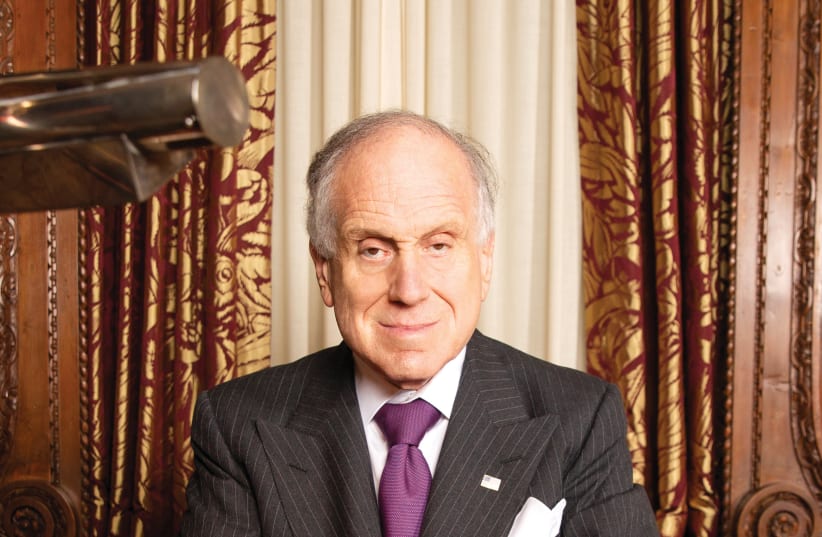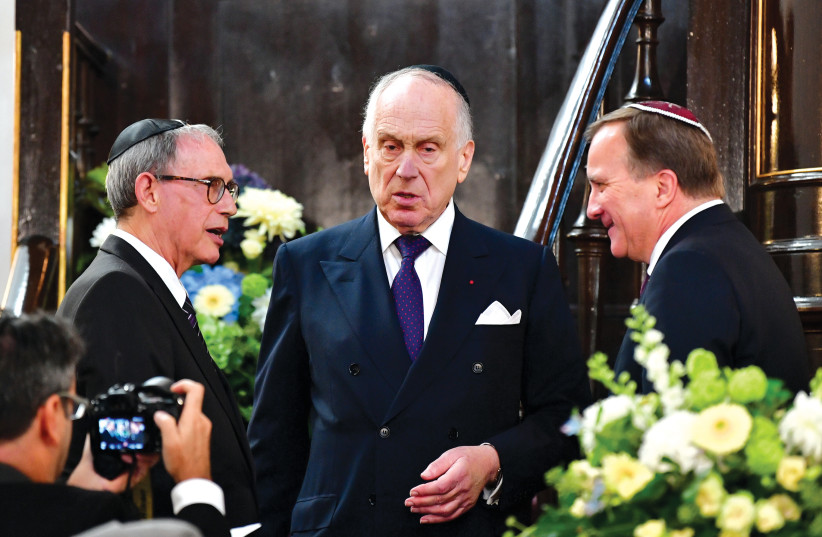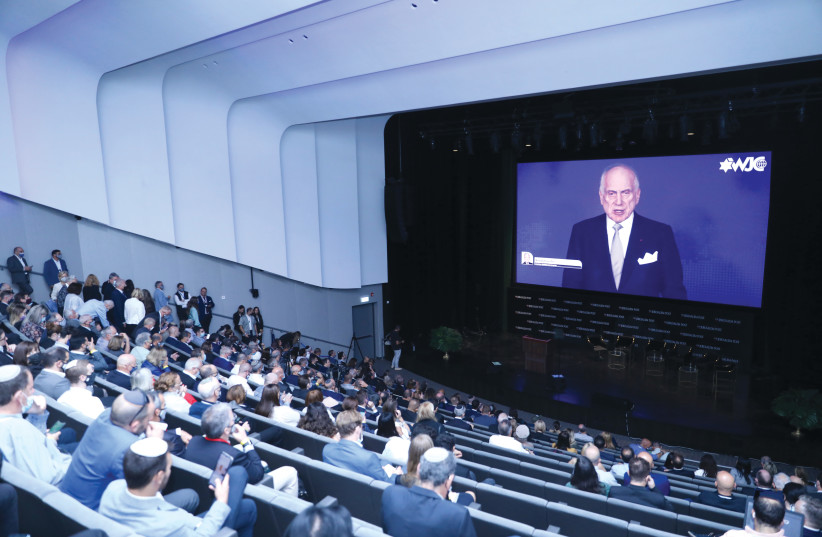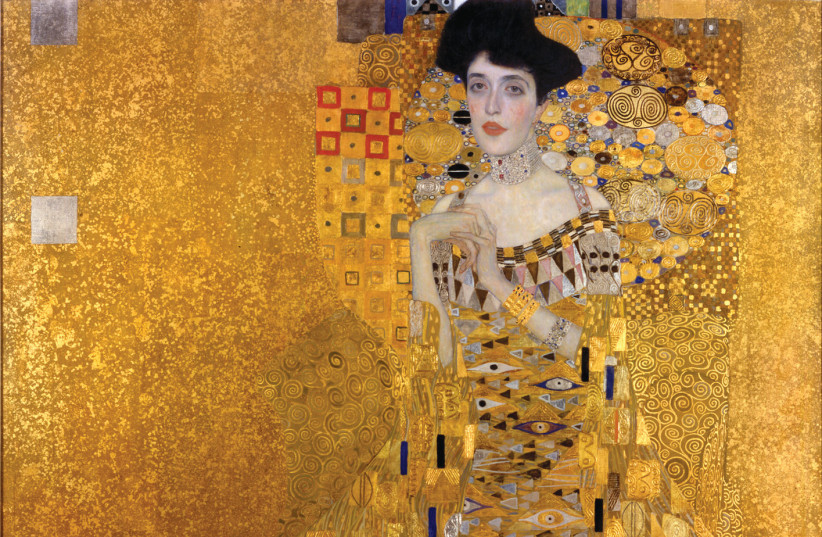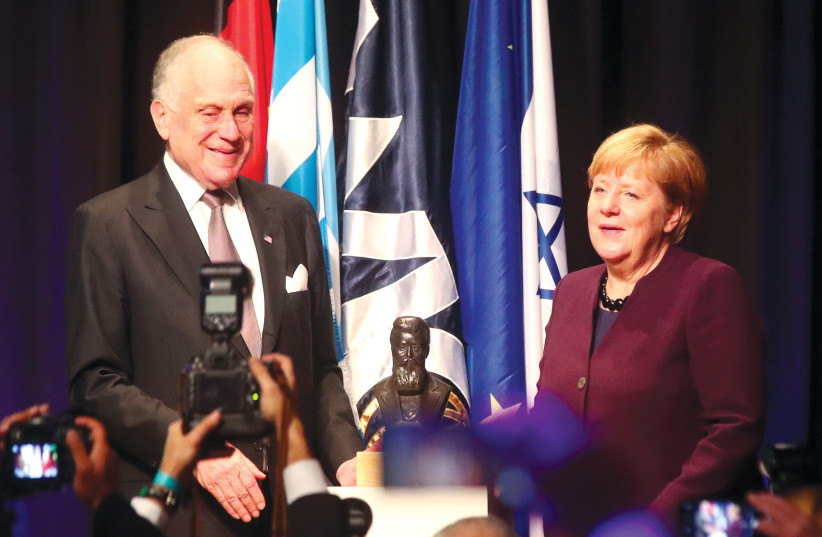RONALD STEVEN Lauder, who has served since 2007 as president of the World Jewish Congress is the leading voice of world Jewry.
His is an authentic, moral voice that doesn’t reflect partisan interests but rather the good of the Jewish people as a whole. He doesn’t seem to fear anyone or anything, nor does he hesitate to speak out whenever he deems fit – in defense of the State of Israel, to advance the Israel-Diaspora relationship and against antisemitism wherever it rears its ugly head.
In an interview with The Jerusalem Report, Lauder says the biggest challenge facing the Jewish world right now is “a crisis in public image and public relations”– or hasbara, as it’s known in Hebrew.
He elaborates in the interview: “Israel is far behind in making crucial investments in hasbara – and, due to that lack of focus, is far behind in the battle for public opinion, particularly in the Diaspora. Unfortunately, that has led to damaging developments. A deficit in public opinion towards Israel has led to a drop in public support for the Jewish people. This has led to a terrifying and unprecedented spike in antisemitic violent acts tacitly supported by public statements from political figures from the far left to the far right, and from celebrities and other notably recognizable, influential figures. We must invest in hasbara to quickly return public opinion squarely behind the safety and prosperity of the Jewish people in Israel and the Diaspora.”
Addressing the Malmö International Forum on Holocaust Remembrance and Combating Antisemitism on October 12, Lauder declared, “If I have learned one thing, it is this: antisemites are cowards. They are bullies. And when they are confronted, they back away and hide. At the same time when there is no reaction to their hate they are emboldened. Silence gives them strength.
“My greatest role as president of the World Jewish Congress has been to fight back. To tell people that we cannot allow this growing group of people to continue this hate... I am not naïve. I realize the hatred of Jews has been with us for 2,000 years and will never completely go away. But we can do everything in our power to keep this virus from spreading.”
A strong believer in education, Lauder called on schools around the world to set aside one day – January 27th, the day Auschwitz was liberated, as Holocaust Awareness Day. “I want every classroom in every city throughout the world to designate this one day – to teach children, what happened, why it happened and how to prevent this from ever happening to any people again.”
After Polish President Andrzej Duda earlier this year signed a law that effectively prevents Holocaust victims and their descendants from recovering stolen property, Lauder lashed out. “The decisions made by the Polish leadership are a slap in the face to survivors of Nazi brutality and their families and to what remains of the Polish Jewish community, and to all those who seek justice,” he tells the Report.
In a video address to the 10th annual Jerusalem Post Conference on October 12, Lauder – who traditionally serves as president of the event – warned that “Israel is losing the political war around the world, and the lies and distortions – the outright dishonesty is taking a very real hold on people. All around the world, people now actually believe that Israel is an apartheid state, Israel is really engaged in ethnic cleansing, Israel is guilty of crimes against humanity. It’s reported as facts on the BBC and the Associated Press, and the front pages of major newspapers everywhere. How else can you explain that when terrorists attack a sovereign nation with 4,000 rockets, it is Israel that is seen as the guilty party?”
Lauder suggested that the singling out of Israel across the globe was not happening by accident. “It’s part of a coordinated attack on Israel’s very legitimacy that began in the Middle East and with the Muslim Brotherhood. And now this enemy has found willing partners in colleges, universities, and in the media,” he said.
“No one was prepared for political war, and perhaps Israel thought people would never believe these ridiculous lies. I am telling you that this political war is much more dangerous, more existential than any war Israel has faced in the past. The battlefield has changed, and Israel must quickly adapt. It must change its tactics, and it must respond in a very different way than it has in the past. There is something else that is missing right now. In the past, Israel had a strong Diaspora that supported it in every war and put pressure on their governments for support, but for the past 15 years, the Diaspora has been neglected.”
LAUDER WAS born in New York City on February 26, 1944. He is the younger son of Joseph and Estée Lauder, founders of multi-million-dollar Estée Lauder Companies. His older brother, Leonard Lauder, is chairman of the board.
He attended the Bronx High School of Science and holds a bachelor’s degree in International Business from the Wharton School of the University of Pennsylvania. He studied at the University of Paris and received a Certificate in International Business from the University of Brussels.
Lauder started to work for Estée Lauder in 1964. Twenty years later, after establishing himself as a successful businessman, he became a Deputy Assistant Secretary of Defense for European and NATO policy at the US Department of Defense. In 1986, President Ronald Reagan named him US ambassador to Austria, a position he held until 1987. He ran for mayor of New York City in 1989, losing to Rudy Giuliani in the Republican primary.
In 1998, Lauder was asked by prime minister Benjamin Netanyahu to launch back-channel negotiations with Syrian leader Hafez al-Assad, and these talks continued after Ehud Barak became prime minister. Lauder communicated a willingness on Assad’s part to make compromises with Israel in an overall land-for-peace deal, and his draft “Treaty of Peace Between Israel and Syria” formed an important part of the ultimately fruitless Israeli-Syrian talks that took place in Shepherdstown, West Virginia in January 2000.
A billionaire in his own right, Lauder made a name for himself as an entrepreneur, philanthropist and art collector, managing investments in real estate and media in the US, Europe and Israel.
On November 16, 2001, Lauder opened the Neue Galerie in New York, an art museum across the street from the Metropolitan Museum of Art that showcases works from Germany and Austria from the early 20th century. In 2006, he purchased from Maria Altmann and her family the painting, Portrait of Adele Bloch-Bauer I, by Gustav Klimt for $135 million, the highest price ever paid for a painting at that time. Lauder called it, “Our Mona Lisa.” The Nazi-looted art painting, which had been restored to Altmann following years of negotiation and litigation with the Austrian government, now forms the centerpiece of the museum’s collection.
In 2020, Lauder gave 91 pieces of arms and armor to the Metropolitan Museum of Art, for which the museum honored him by naming its entire group of Arms and Armor galleries for him.
Lauder was elected president of the World Jewish Congress on June 10, 2007, following the resignation of Edgar Bronfman, Sr. In his role as president of the WJC, which today represents Jewish communities in 106 countries, Lauder meets regularly with heads of state, prime ministers and government representatives to discuss and advance causes of concern to Jews and Jewish communities internationally. He advocates for Israel, especially in times when the state or its citizens are under attack, encourages and aids the development of vibrant Jewish communities around the world, and supports a two-state solution to the Israeli-Palestinian conflict.
On October 23, 2019, Lauder presented the WJC’s highest honor, the Theodor Herzl award, to German Chancellor Angela Merkel for her strong stand in defense of the Jewish people and against antisemitism.
Lauder serves as chairman of the Auschwitz-Birkenau Memorial Foundation, which supports the preservation of the remains of the former Nazi death camp. In January 2020, the foundation brought a delegation of more than 100 survivors and their families to the memorial site to participate in the commemoration of the 75th anniversary of the liberation of the camp.
Lauder says his experience as the US ambassador in Austria heightened his deep appreciation of, and his commitment to, his Jewish heritage. During his tenure, he initiated what has become a core personal mission: supporting the revitalization of Jewish life across central and eastern Europe in communities that had been devastated by the Holocaust and remained suppressed under Communism. In 1987, he established the Ronald S. Lauder Foundation, which supports Jewish schools, camps and community centers in Austria and across Europe.
Lauder was elected president of the Jewish National Fund in 1997, and after a successful 10-year tenure, became chairman of the board.
He lives in New York, is married to Jo Carole (Knopf) Lauder, and has two children, Aerin and Jane.
Here is my interview with him:
As president of the WJC, what do you see as the biggest challenge facing the Jewish world at the moment?
A crisis in public image and public relations. Let me explain: Israel is far behind in making crucial investments in hasbara – and, due to that lack of focus, is far behind in the battle for public opinion, particularly in the diaspora. Unfortunately, that has led to damaging developments. A deficit in public opinion towards Israel has led to a drop in public support for the Jewish people. This has led to a terrifying and unprecedented spike in antisemitic violent acts tacitly supported by public statements from political figures from the far left to the far right, and from celebrities and other notably recognizable, influential figures.
We must invest in hasbara to quickly return public opinion squarely behind the safety and prosperity of the Jewish people in Israel and the Diaspora. This is a key investment that I will be focused on over the next four years. Watch this space.
How do you think Israel and the US should tackle the Iranian issue?
The bottom line is that Iran must not be allowed to obtain nuclear capabilities, and in order to ensure that they do not, Israel and the United States must be firm, committed, trusting and wholly unified partners in dealing with Iran. That unity is the most important element to success - and to Israel and the American people’s security.
What is your position on what to do on the Palestinian track?
Lasting peace between Israel and Palestine is the only way that Israel’s long-term preservation is assured. I propose looking closely at the Abraham Accords, begun by the two previous American and Israeli administrations and, I hope, continued by President Biden and Prime Minister Bennett. Normalization is working well with moderate Arab nations – and that philosophy and practices, based on economic interests and economic development, can work between Israel and the Palestinians. The goal of a two-state solution remains paramount, and I am fully committed to it, as is the United States. It is my hope that Israel itself more fully and boldly engages in the peace process.
How do you see tension between the Jewish world and Poland resolving itself, if at all?
It has not, so far. The decisions made by Polish leadership is a slap in the face to survivors of Nazi brutality and their families and to what remains of the Polish Jewish community, and to all those who seek justice. Now, the priority must be to make sure that this type of policy does not migrate to other eastern and central European countries. I am currently holding high-level conversations with government leaders across Europe to ensure that other countries remain committed to justice for survivors and their families.
Are you continuing to see a spike in antisemitism around the world, especially in the US, and do you think it’s related to the pandemic?
Yes, I do see a continued spike – and it comes from multiple directions. For example, the pandemic has led to a surge in misinformation and hate online and social media platforms have done far too little to curtail it. In fact, the WJC is making new strategic investments in cybersecurity including tracking and calling out hate and misinformation online.
Much of this emanates from far-right and far-left sources – and it has seeped into the mainstream due to the mainstreaming of extreme political figures. For example, though the issue resolved itself a day later thanks to cooler heads, US House of Representatives Speaker Nancy Pelosi’s recent 24-hour decision to let the far-left, anti-Israel so-called “squad” pull funding for Israel’s Iron Dome was wrong and terrifying. It showed that too often, leaders bow to anti-Israel and antisemitic extremists.
How do you rate the performance of the new Israeli government?
So far, so good. Prime Minister Bennett and Foreign Minister Lapid have my full support and my friendship. Each leader has also done an exemplary job in reaching out and cultivating the international community. For instance, PM Bennett was highly visible during the most recent United Nations General Assembly. Being present is key.
What are your goals as president of the WJC for the upcoming year?
To invest in hasbara to fight antisemitism, and to secure commitments from world leaders and public figures to join in this fight. That’s why I am making key investments designed to fight antisemitism by encouraging growth in connection to Judaism and Jewishness among the under-40 generation.
If the last year has shown us anything, it’s that conversations that impact the Jewish community are increasingly taking place on new platforms and among younger crowds. They are now the ones on the front lines. If we are to ensure a strong future, we must invest in fostering strong Jewish leaders among the next generation. I look forward to investing in the development of dynamic, enthusiastic groups of young Jews and new allies through the programs of the Word Jewish Congress. We hope to announce a strategic campaign soon to work with students on college campuses in confronting antisemitism and antisemitic professors, and generally to meet young Jews and non-Jews where they are, including on social media.
As we bid farewell to German Chancellor Angela Merkel, what is it about her that inspired you to present her with an award?
Where do I start? There is not just one thing. Chancellor Merkel is a friend and a role model, to me personally and to the Jewish people in Germany, across Europe, in Israel and around the world. She has ushered in a new Germany that is an example to Europe and the world. She will be missed, but I am optimistic that the new leadership in Germany will build on her legacy.
Who inspires you in the world/Jewish world today?
Young people who embrace, value, and take pride in their Jewishness!
